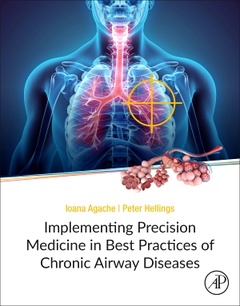Implementing Precision Medicine in Best Practices of Chronic Airway Diseases
Coordonnateurs : Agache Ioana, Hellings Peter

Implementing Precision Medicine in Best Practices of Chronic Airway Diseases provides a comprehensive overview of the application of precision medicine in airway diseases with a goal of promoting optimal control of disease, higher patient satisfaction and disease prevention. As medical research continues to fund this area, the book highlights the need for implementation of the principles of precision medicine into the bedside management of chronic airway diseases. It is clear that chronic airway diseases are heterogeneous and that a personalized approach is warranted whereby treatment is tailored to the level of the individual patient.Written for basic researchers, medical doctors and other healthcare practitioners this book provides guidance on the implementation of the principles of precision medicine into further research and daily clinical practice.
Part I The Concept of Precision Medicine and Precision Health 1. The Audacious Goal of Precision Medicine 2. Critical Entry Points—Genetics and Epigenetics 3. Critical Entry Points—Microbiome 4. Factors Modulating the Disease Endotype 5. Revised Disease Nomenclature Including Disease Endotypes
Part II Shortcomings of Current Care Pathways for Chronic Airways Diseases 6. The Global Burden of Chronic Airway Diseases 7. Unmet Needs in Chronic Upper Respiratory
Part III Personalized Care: Endotype-driven Treatment 8. Endotype-Driven Approach for Asthma 9. Endotype-Driven Approach for Chronic Rhinosinusitis 10. Endotype-Driven Approach in Rhinitis 11. Prevention of Allergies 12. Prevention of Asthma 13. Prevention of Chronic Rhinosinusitis 14. Current and Future Biomarkers for Allergy and Asthma 15. Validation and Qualification of Biomarkers and Their Translation Into Pathway-Specific Diagnostic Tests 16. Critical Issues for the Endotype/Biomarkers Approach 17. Key Points for Moving the Endotypes Field Forward
Part IV Health Information Technology and PM 18. Telemedicine and Mobile Health Technology in the Diagnosis, Monitoring and Treatment of Respiratory Allergies 19. Real-Time Clinical Decision Support at the Point of Care 20. Patient-Friendly HIT Tools and the Advent of Crowdsourcing Clinical Trials
Part V Participation of the Patient 21. The Patient-Centered Decision System as per the 4Ps of PRECISION MEDICINE 22. Interpersonal Dimensions of Personalized Medicine for Chronic Obstructive Pulmonary Disease
Part VI Bringing Precision Medicine to the Clinic 23. Big Data Translation Into Clinical Decision Algorithms 24. European Union Funding of Research on Airway Diseases 25. Provision of Care - Implementation of the Finnish Allergy Programme 2008-2018 26. Improving Understanding and Common Usage of Disease Phenotypes, Endotypes, Biomarkers and Precision Therapies at the Point of Care 27. Full Patient Monitoring Using Digital Health Technology 28. Global Multidisciplinary Networks 29. EUFOREA Approach to Precision Medicine in Respiratory Diseases
The book will be of interest to basic researchers and medical doctors and scientists in the field of airway diseases, including pulmonologist, ear nose throat specialists, pediatricians, allergologists, general practitioners.
Since August 2004 Dr. Peter Hellings has been working at the Dept. of Otorhinolaryngoloy of the University Hospitals Leuven and was nominated docent and head docent at the KU Leuven in 2004 and 2008 respectively. He has been nominated full professor (hoogleraar) at the KU Leuven in Oct. 2012. Since 2014, he is also nominated full professor (hoogleraar) at the Academic Medical Center in Amsterdam, and nominated guest professor at the University of Ghent in 2015. He has been the organizing president of the annual meeting of the European Academy of Facial Plastic Surgery in Bruges in 2011, under the High Patronage ofH.R.H.ueen Mathilde of Belgium, and of the bi-annual European scientific SERIN meeting in Leuven in 2013, under the High Patronage of H.R.H. Pri
- Bridges the gap between precision medicine research and the implementation of the principles into daily clinical practice
- Includes contributions from key opinion leaders in the field of airway disease giving a worldwide perspective
- Discusses precision medicine in terms of personalized and stratified medicine, biomarkers, prediction of success, participation of the patient and prevention of disease
Date de parution : 09-2018
Ouvrage de 228 p.
21.4x27.6 cm
Thème d’Implementing Precision Medicine in Best Practices of... :
Mots-clés :
AIRWAYs ICP; Adhenerance; Adherence; Allergen avoidance; Allergen exposure; Allergic rhinitis; Allergy; Allergy health; Allergy programme; Asthma; Asthma programme; Bacteria; Biologics; Biomarker; Biomarkers; COPD; Children; Chronic airway diseases; Chronic respiratory disease; Chronic respiratory diseases; Chronic rhinosinusitis; Chronic upper respiratory tract disease; Clinical decision support systems; Clinical history; Consultations; Digital solutions; Disease endotype; Disease phenotype; Endotype; Environment; Environmental exposure; Epigenetics; Epithelial dysfunction; European Union; Exposome; Framework programme; Funding; GARD; Genetic; Genetics; Genome-wide association study; Guideline implementation; Histamine; Holistic; Hypersensitivity; Immune response; Immune tolerance; Infectious rhinitis; Inflammation; Interpersonal; Microbial exposure; Microbiome; Mobile application; Mobile applications; Mobile health technology; Mobile phone; Monitoring; Mucosal immune system; Multistakeholder approach; Nasal polyps; Neurogenic inflammation; Nonallergic noninfectious rhinitis; Nutrition; Occupational allergy; Omics; P4 medicine; Pathogenesis of asthma; Patient reported outcome measure; Patient-centered; Patients; Patients reported outcomes; Personalized care; Personalized medicine; Pharmaco-genomics; Phenotype; Population association genetics; Precision medicine; Prevention; Preventive strategies for asthma; Protection; Public health; Quality of life; Research and innovation; Respiratory diseases; Rhinitis; Rhinosinusitis; Risk factor; Self-management; Severe asthma; Shared decision-making; Short-chain fatty acids; Single nucleotide polymorphisms; Sinusitis; Smart sensor; Staphylococcus aureus; Stratified medicine; Th2 inflammation; Treatment for asthma; WHO


